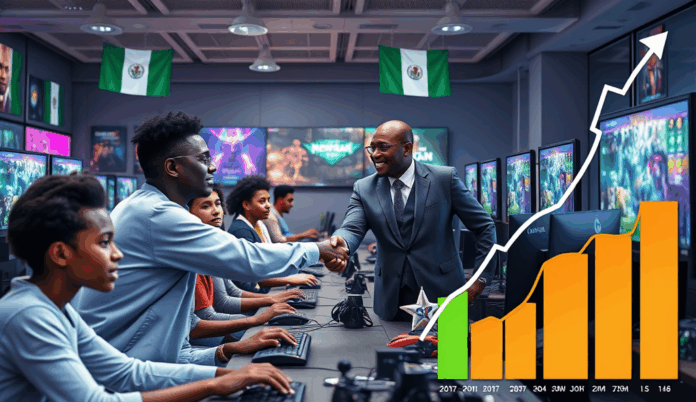Introduction to the Gaming Industry Growth in Nigeria
Nigeria’s gaming industry is experiencing rapid expansion, fueled by increasing smartphone penetration and a youthful population eager for digital entertainment. With over 60% of Nigerians under 25, the country’s gaming market grew by 25% annually since 2020, according to a report by Techpoint Africa.
Local game development startups like Maliyo Games and Kuluya are gaining traction, showcasing Nigeria’s potential in creating culturally relevant content. The rise of esports in Nigeria has also contributed significantly, with tournaments like the African Gaming League attracting thousands of participants and viewers.
This growth is further supported by tech hubs such as Co-Creation Hub, which provide resources for young developers to innovate. As we explore the current state of the industry, it’s clear that government policies and private investments will play pivotal roles in sustaining this momentum.
Key Statistics

Current State of the Gaming Industry in Nigeria
Nigeria's gaming industry is experiencing rapid expansion fueled by increasing smartphone penetration and a youthful population eager for digital entertainment.
Nigeria’s gaming industry now generates over $100 million annually, driven by mobile gaming, which accounts for 70% of revenue, according to a 2023 report by PwC Nigeria. Platforms like Google Play and local app stores have become key distribution channels for games like Maliyo’s *Afro Brawl*, which blends Nigerian folklore with competitive gameplay.
The rise of esports in Nigeria has transformed casual gaming into a lucrative career path, with tournaments offering prizes exceeding $50,000. Communities like Naija Esports Federation are nurturing talent, while streaming platforms such as YouTube Gaming amplify local gamers’ reach.
Tech hubs and accelerators continue to bridge gaps, with Lagos-based initiatives like Andela training developers in Unity and Unreal Engine. As infrastructure improves, the next section explores how shifting demographics and digital adoption are fueling this growth among young adults.
Factors Driving the Growth of Gaming Among Young Adults
Nigeria’s gaming industry now generates over $100 million annually driven by mobile gaming which accounts for 70% of revenue.
Nigeria’s youthful population, with 70% under 30, fuels gaming adoption, as affordable smartphones and cheaper data plans make mobile gaming accessible to over 60 million users. Localized content like Maliyo’s *Afro Brawl* resonates with players, while esports tournaments offer financial incentives, attracting over 10,000 participants annually.
Tech hubs like Andela and government-backed initiatives such as the National Digital Economy Policy are equipping young developers with skills in Unity and Unreal Engine, fostering homegrown talent. Streaming platforms like YouTube Gaming amplify visibility, turning gamers like “KingNeff” into influencers with six-figure followings.
Rising internet penetration, projected to reach 65% by 2025, and increased venture capital funding for startups like Kuluya are accelerating industry expansion. This sets the stage for exploring popular platforms and trends shaping Nigeria’s gaming landscape next.
Popular Gaming Platforms and Trends in Nigeria
The gaming industry is creating tangible economic opportunities for Nigerian youth with esports tournaments offering prize pools exceeding $50000 annually.
Mobile gaming dominates Nigeria’s gaming landscape, with platforms like Google Play Store and App Store hosting locally developed titles like Maliyo’s *Afro Brawl*, which cater to over 60 million users. Battle royale games like *Free Fire* and *PUBG Mobile* are particularly popular, with tournaments drawing thousands of participants annually, reinforcing the rise of esports in Nigeria.
Streaming platforms such as YouTube Gaming and Twitch amplify engagement, with influencers like “KingNeff” leveraging these spaces to build six-figure followings while showcasing Nigerian gaming culture. Local developers are also gaining traction, with startups like Kuluya creating hyper-casual games tailored to Nigerian audiences, supported by tech hubs like Andela.
The shift toward cloud gaming is emerging, driven by improved internet penetration and affordable data plans, enabling seamless access to high-quality games. This growth sets the stage for examining the economic impact of gaming on Nigerian youth, as monetization opportunities expand through ads, sponsorships, and in-game purchases.
Economic Impact of the Gaming Industry on Nigerian Youth
Despite infrastructure challenges Nigeria’s gaming sector offers young adults diverse opportunities from esports tournaments to mobile game development roles.
The gaming industry is creating tangible economic opportunities for Nigerian youth, with esports tournaments like *Free Fire* competitions offering prize pools exceeding $50,000 annually, attracting both players and sponsors. Streaming platforms have turned influencers like “KingNeff” into entrepreneurs, earning through ads and brand deals while promoting local gaming culture.
Hyper-casual game developers like Kuluya are monetizing through in-app purchases and ads, with some titles generating over 1 million downloads monthly. Tech hubs like Andela are nurturing talent, enabling young developers to earn from global partnerships while addressing local gaming demands.
The rise of cloud gaming is further expanding revenue streams, as affordable data plans allow youth to monetize skills through subscriptions and virtual goods. However, these opportunities face systemic challenges, setting the stage for examining barriers to industry growth.
Challenges Facing the Gaming Industry in Nigeria
With Nigeria’s gaming industry projected to reach $126 million by 2025 emerging technologies like blockchain and VR present new opportunities for local developers.
Despite the growth of esports tournaments and mobile gaming trends in Nigeria, unreliable electricity and high internet costs hinder consistent participation, with only 48% of urban areas having stable power supply. Local game developers also face funding gaps, as venture capital for Nigerian gaming startups remains scarce compared to global counterparts, limiting scalability for studios like Kuluya.
Payment infrastructure challenges persist, as many gamers lack access to international payment gateways required for in-app purchases or tournament registrations. This creates revenue leakage, with an estimated 30% of potential gaming income lost annually due to limited local payment solutions tailored for digital entertainment expansion.
While tech hubs like Andela nurture talent, brain drain remains an issue as skilled developers often relocate abroad for better opportunities. These systemic barriers must be addressed to fully unlock the investment opportunities in Nigerian gaming highlighted in the next section on youth potential.
Opportunities for Young Adults in the Nigerian Gaming Sector
Despite infrastructure challenges, Nigeria’s gaming sector offers young adults diverse opportunities, from esports tournaments like the African Gaming League to mobile game development roles at studios such as Maliyo Games. With over 60% of the population under 25, youth engagement in Nigerian gaming is driving demand for localized content, creating niches in storytelling and game design.
Tech hubs like Co-Creation Hub provide training programs, equipping young developers with skills to build games like “Arena of Valor” adaptations for African audiences. Freelance opportunities in QA testing and community moderation are also growing, with platforms like Upwork connecting Nigerian talent to global gaming projects.
The rise of esports in Nigeria has birthed professional gamers and streamers earning through platforms like YouTube and Twitch, despite payment hurdles. As the industry expands, these pathways highlight how young Nigerians can leverage gaming for careers, setting the stage for discussions on government and private sector support needed to sustain growth.
Government and Private Sector Support for Gaming Growth
To sustain the momentum of Nigeria’s gaming industry growth, both government and private sector initiatives are crucial. The National Information Technology Development Agency (NITDA) has launched programs like the Nigeria Digital Innovation Initiative, offering grants to gaming startups, while states like Lagos partner with tech hubs to host gaming hackathons.
Private investors, such as Ventures Platform, are funding local studios like Kuluya Games to scale African-themed mobile games.
Payment solutions like Flutterwave and Paystack now support in-game transactions, addressing hurdles faced by esports professionals and streamers mentioned earlier. MTN Nigeria’s sponsorship of tournaments like the Gamr Africa League demonstrates corporate backing for competitive gaming, complementing grassroots efforts by organizations like Naija Game Dev.
These collaborations create an ecosystem where young developers and gamers can thrive despite infrastructure gaps.
As these partnerships expand, they lay the foundation for the future prospects of Nigeria’s gaming industry, where policy reforms and increased investment could unlock further potential. The next section explores how emerging technologies and demographic shifts might shape this trajectory.
Future Prospects of the Gaming Industry in Nigeria
With Nigeria’s gaming industry projected to reach $126 million by 2025, emerging technologies like blockchain and VR present new opportunities for local developers to create immersive experiences. Startups like Maliyo Games are already leveraging these tools to build hyper-localized content, while esports platforms like Gamr Africa attract over 50,000 monthly active users, signaling growing youth engagement.
The rise of mobile gaming trends in Nigeria, fueled by affordable smartphones and improved internet penetration, positions the country as a key player in Africa’s digital entertainment expansion. Government-backed tech hubs like Co-Creation Hub (CcHUB) continue to incubate gaming startups, complementing private investments that grew by 35% in 2023, according to the Nigerian Game Developers Association.
As demographic shifts favor a younger, tech-savvy population, partnerships between telcos like Airtel and gaming studios could further accelerate industry growth. These developments set the stage for the conclusion on how sustained collaboration can solidify Nigeria’s position in the global gaming ecosystem.
Conclusion on the Gaming Industry Growth in Nigeria
The gaming industry in Nigeria has shown remarkable growth, with mobile gaming trends and esports tournaments driving youth engagement across major cities like Lagos and Abuja. Local game development startups, supported by tech hubs like CcHub, are creating culturally relevant content that resonates with Nigerian players while attracting global attention.
Revenue projections indicate a potential 25% annual increase, fueled by rising smartphone penetration and digital entertainment expansion among young adults. Government policies and private investments are gradually creating an ecosystem where gaming can thrive as both a cultural export and economic driver.
As the industry matures, opportunities for careers in game development, streaming, and esports management are becoming more accessible to Nigerian youth. The next phase of growth will depend on sustained infrastructure development and policies that nurture local talent while welcoming global partnerships.
Frequently Asked Questions
How can I start a career in game development in Nigeria?
Join tech hubs like Andela or CcHub for training in Unity/Unreal Engine and build portfolio projects using free assets from itch.io.
What are the best ways to monetize gaming skills in Nigeria?
Stream on YouTube Gaming/Twitch for ad revenue or compete in esports tournaments like Gamr Africa League with prize pools up to $50K.
Can I succeed in gaming without expensive equipment?
Yes! Start with mobile games like Free Fire or develop lightweight hyper-casual games using Godot Engine on budget laptops.
How do I access funding for my gaming startup in Nigeria?
Apply for NITDA grants or pitch to investors like Ventures Platform while showcasing prototypes built with free tools like GDevelop.
What payment solutions work for Nigerian gamers?
Use Paystack or Flutterwave for in-game purchases and tournament fees as they support local cards and mobile money.


